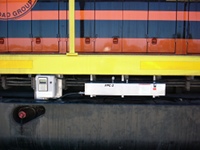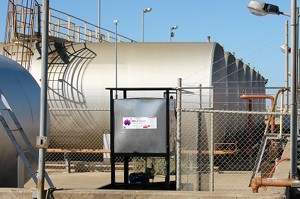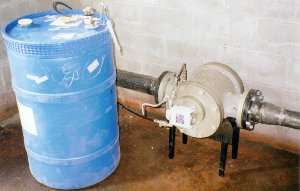The most trusted fuel additive in the world
More than 40 railroads are using FPC. Don't be the last organization to learn about and implement this strategic advantage. Cut your operating costs, greenhouse emissions, and risk of wayside fires by taking the first step to treating your fleet with FPC. Contact us today so we can start our partnership together.
The RP-503 says it all, and we've passed it twice
FPC is the only fuel additive that we know of to have passed the RP-503 conducted at Southwest Research Institute (SwRI). The Association of American Railroads (AAR) RP-503 procedure is a scientific approach to testing the effectiveness of a fuel additive on a locomotive engine. The RP-503 is a three-phase test that examines the fuel properties, exhaust emissions, engine wear patterns, and fuel consumption changes with and without fuel treatment on an EMD 645E3B (12 cylinder) diesel engine. The test is extremely thorough and costs approximately $250,000 to perform. FPC has been tested twice using the AAR RP-503 procedure. For the first RP-503, FPC was tested on a brand-new, laboratory engine. For the second RP-503, FPC was tested on an in-service locomotive engine.
The results of the RP-503 tests for FPC show:
- A 1.74% reduction in fuel consumption on a brand-new, laboratory engine
- 2.8% to 7.8% reduction in fuel consumption depending on throttle and load for an in-service engine
- No adverse engine wear or deposits on engine components
- No increase in regulated exhaust emissions
- No alteration of fuel specifications
If you would like an electronic copy (Adobe Acrobat PDF) of our RP-503 results from Southwest Research Institute just click here.
We understand the value of your locomotives
Having serviced the railroad industry for more than 25 years, we understand the financial investment you have made in your locomotives. The RP-503 confirms that FPC does not alter fuel specifications in any way. Using FPC will not void the warranty on your locomotives. The active ingredient in FPC has been used since 1944 and has never damaged an engine of any type or size in any way, shape, or form. Tens of billions of dollars worth of equipment have been treated with FPC. FPC is listed as a non-flammable liquid for shipping within North America and does not contain chemicals that would make your fuel hazardous.
Let us earn your trust
Our manufacturing facility in the United States currently has the capacity to treat 12 million gallons of fuel each day (3 billion gallons a year), and we have the space to expand to treat 60 million gallons of fuel each day (15 billion gallons a year). The trust of our customers has made us what we are today.
We want the opportunity to earn your trust as well. When you contact us, we will be happy to answer questions from every stakeholder in each department of your organization. The ridiculous and false claims made by our competitors have built a healthy level of skepticism toward fuel additives. FPC is different. We're not looking for an instant purchase order to treat your entire fleet; we're looking for the opportunity to start a partnership with you, to present the wealth of testing and results from over 25 years of locomotive fuel treatment, and to answer all of the questions that your organization has about FPC. Our long relationship with the railroad industry has resulted in an extensive library of independent laboratory test results, railroad field test results, and testimonials from satisfied railroad customers that help support our claims. Let us prove to you that you will not be wasting your time by investigating FPC.
Savings Estimate
We save our customers millions of dollars per year. Take a look at our savings calculator to see how much you could be saving. The savings calculator is tailored to include only the test results from your industry and uses averages from our extensive testing library.
Railroad Testing
FPC has been used by railroads for decades. We currently have 34 test reports by various railroads and our test reports page has 210 reports, which contain a total of 2,556 tests. We invite you to be the author of our newest railroad test report: contact us and let's get started today.
More than just fuel savings
FPC has many benefits, and by clicking the links below you will be taken to the test reports for the railroad industry showing that FPC:
- Increases fuel efficiency
- Reduces emissions including CO2
- Reduces the likelihood of wayside, right of way fires
- Eliminates organisms living in fuel tanks
- Reduces engine wear
- Reduces metal contaminants in the oil
- Reduces maintenance costs
Deployment Strategy
FPC has been used by railroads for decades, and we have an extensive track record available to you in our test library. However, you may elect to do testing on your own equipment. We have a number of portable test systems that can record the efficiency and emissions of your equipment before and after treatment with FPC. Please contact us and we can work together to add your findings to our test library.
After testing is complete and a decision has been made to treat with FPC, we will be able to design a dosing procedure that is tailored to your fueling operations. In the past we have used automated dosing equipment on fuel storage tanks in rail yards, worked with fuel distributors to treat fuel with FPC for wayside refueling, and even placed dosing systems on locomotives. Regardless of your special circumstances, we can work with you to develop a dosing process that minimizes or eliminates labor costs associated with treatment with FPC.
Are you a railroad fuel distributor?
At FPC we are always looking to partner with railroad fuel distributors to reduce the cost for railroads to treat their fuel with FPC. We support fuel distributors with information on dosing units that can be installed on fuel distribution trucks and tankers to minimize the labor involved in fuel treatment. Many railroads rely on their fuel distributor to support their fuel treatment with FPC.
We need your help to support railroad treatment! If you are a fuel distributor who can support fuel treatment or would like to learn more about automated fuel treatment technologies for fuel distributors then we want to hear from you!
Let us help you win new customers
By being a part of our fuel distributor network, we may be able to help win you new business. When we discuss fuel treatment options with potential railroad customers we rely on our fuel distribution partners to be part of our treatment proposal. By joining our network of trusted fuel distributors you will have the opportunity to be part of our formal treatment proposals for our railroad customers.



